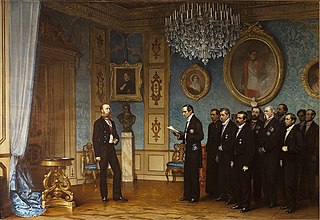
The politics of Mexico function within a framework of a federal presidential representative democratic republic whose government is based on a multi-party congressional system, where the President of Mexico is both head of state and head of government. The federal government represents the United Mexican States and is divided into three branches: executive, legislative and judicial, as established by the Political Constitution of the United Mexican States, published in 1917. The constituent states of the federation must also have a republican form of government based on a congressional system as established by their respective constitutions.

The Institutional Revolutionary Party is a political party in Mexico that was founded in 1929 and held uninterrupted power in the country for 71 years, from 1929 to 2000, first as the National Revolutionary Party, then as the Party of the Mexican Revolution and finally as the PRI beginning in 1946.

The National Action Party is a conservative political party in Mexico founded in 1939. The party is one of the main political parties in Mexico, and since the 1980s has had success winning local, state, and national elections.

The Spanish Socialist Workers' Party is a social-democratic political party in Spain. The PSOE has been in government longer than any other political party in modern democratic Spain: from 1982 to 1996 under Felipe González, from 2004 to 2011 under José Luis Rodríguez Zapatero, and since 2018 under Pedro Sánchez.

The Party of the Democratic Revolution is a social democratic political party in Mexico. The PRD originated from the Democratic Current, a political faction formed in 1986 from the Institutional Revolutionary Party (PRI). The PRD was formed after the contested general election in 1988, which the PRD's immediate predecessor, the National Democratic Front, believed was rigged by the PRI. This sparked a movement away from the PRI's authoritarian rule.

The Christian Democratic Party is a Christian democratic political party in Chile. There have been three Christian Democrat presidents in the past, Eduardo Frei Ruiz-Tagle, Patricio Aylwin, and Eduardo Frei Montalva.

The Ecological Green Party of Mexico is a green-conservative political party in Mexico. In the 2012 legislative elections, the party took 34 seats in the Chamber of Deputies and nine seats in the Senate. During the 2012 Presidential election, PVEM supported Enrique Peña Nieto (EPN), the candidate from the Institutional Revolutionary Party (PRI), who was elected. In 2018, PVEM supported Todos por México coalition, along with PRI and PANAL. José Antonio Meade, the coalition's candidate, came in third in a four-way race, with 16.43% of the vote. PVEM later withdrew from Todos por Mexico and gradually came close to the government, formally entering the Juntos Haremos Historia coalition in 2019. In December 2020 it founded the Juntos Hacemos Historia coalition, together with the National Regeneration Movement and the Labor Party and contested the 2021 Mexican legislative elections with them.

The Senate of the Republic, constitutionally Chamber of Senators of the Honorable Congress of the Union, is the upper house of Mexico's bicameral Congress. It currently consists of 128 members, who serve six-year terms.

The Labor Party is a political party in Mexico. It was founded on 8 December 1990. The party is currently led by Alberto Anaya.

Manuel de Jesús Clouthier del Rincón was a Mexican agriculturalist, businessman and politician. His 1988 presidential campaign challenged the dominance of Mexico's PRI party in the nation's politics, with rhetoric and protests before, during and after the elections. Although officially coming in third, he remained a prominent political force in Mexico until his death in a car accident a year after the elections.

Gilberto Rincón Gallardo y Meltis was a Mexican politician, activist and former presidential candidate.

Dora Patricia Mercado Castro is a Mexican feminist politician. She is a founder, former president and the 2006 presidential candidate of the extinct Social Democratic Party.

Marcelo Luis Ebrard Casaubón is a Mexican politician who served as Secretary of Foreign Affairs until 2023. Affiliated with the National Regeneration Movement (MORENA) since 2018, he was appointed to lead the foreign ministry by President Andrés Manuel López Obrador on 1 December 2018. In June 2023, he resigned from his post to compete for his party's presidential candidacy for the 2024 election.

The New Alliance Party is a state-level political party in Mexico founded in 2005.
The Movement of National Liberation (MLN) was a Mexican leftist political party composed of numerous socialist, Marxist, and peasant activist groups. They operated primarily between 1961 and 1964.

The Mexican nobility were a hereditary nobility of Mexico, with specific privileges and obligations determined in the various political systems that historically ruled over the Mexican territory.

The Social Democratic Party or Social Democratic and Peasant Alternative Party was a left-wing Mexican political party between 2005 to 2009. it defined itself as a New Left party and distanced itself from what they claimed was the "conflictive left" in Mexico. founded by Patricia Mercado and Ignacio Irys Salomon, The party nominated Patrica Mercado for the 2006 General Election.

MORENA is a major Mexican left-wing political party. It is described as an anti-neoliberal and populist party. It is the ruling party of Mexico since 2018. As of 2023, it is the largest political party in Mexico by number of members.

The National Council to Prevent Discrimination is a Mexican government agency created in 2003 by Federal Law to Prevent and Eliminate Discrimination and to promote policies and measures to contribute to the cultural and social development and progress in social inclusion and guarantee the right to equality.

Gubernatorial elections were held in Mexico on June 6, 2021. Governors were to be elected in the states of Baja California, Baja California Sur, Chihuahua, Colima, Guerrero, Michoacán, Nayarit, Nuevo León, Sinaloa, Sonora, Campeche, Querétaro, San Luis Potosí, Tlaxcala, and Zacatecas. The formal period of campaigning is from March 5 to June 2, 2021.


















